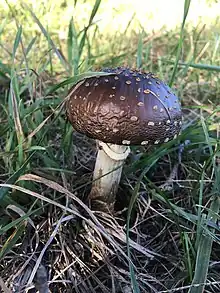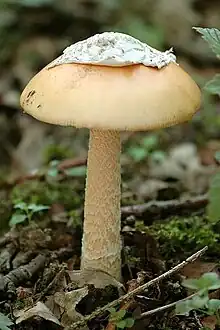Amanita ibotengutake
Amanita ibotengutake is a species of agaric fungus in the family Amanitaceae native to Japan. It was first described in 2002 as distinct on a genetic level from A. pantherina, and earlier has been classified under that name.[1][2]
| Amanita ibotengutake | |
|---|---|
 | |
| Scientific classification | |
| Domain: | Eukaryota |
| Kingdom: | Fungi |
| Division: | Basidiomycota |
| Class: | Agaricomycetes |
| Order: | Agaricales |
| Family: | Amanitaceae |
| Genus: | Amanita |
| Species: | A. ibotengutake |
| Binomial name | |
| Amanita ibotengutake T. Oda, C. Tanaka & Tsuda, 2002 | |
| Amanita ibotengutake | |
|---|---|
| Gills on hymenium | |
| Cap is flat | |
| Hymenium is free | |
| Stipe has a ring and volva | |
| Spore print is white | |
| Ecology is mycorrhizal | |
| Edibility is poisonous or psychoactive | |
The scientific name derives from Japanese name of A. strobiliformis, ibotengutake (疣天狗茸, lit. "wart tengu mushroom"), which inspired the name of ibotenic acid. A. ibotengutake contains ibotenic acid and muscimol, rendering it toxic and psychoactive.[1]
References
- Oda, Takashi; Yamazaki, Tomoko; Tanaka, Chihiro; Terashita, Takao; Taniguchi, Naoki; Tsuda, Mitsuya (November 2002). "Amanita ibotengutake sp. nov., a poisonous fungus from Japan". Mycological Progress. 1 (4): 355–365. doi:10.1007/s11557-006-0032-9. ISSN 1617-416X. S2CID 31256231.
- "Amanita ibotengutake T. Oda, C. Tanaka & Tsuda". Catalogue of Life. Species 2000: Leiden, the Netherlands. Retrieved 5 January 2023.
This article is issued from Wikipedia. The text is licensed under Creative Commons - Attribution - Sharealike. Additional terms may apply for the media files.

.jpg.webp)